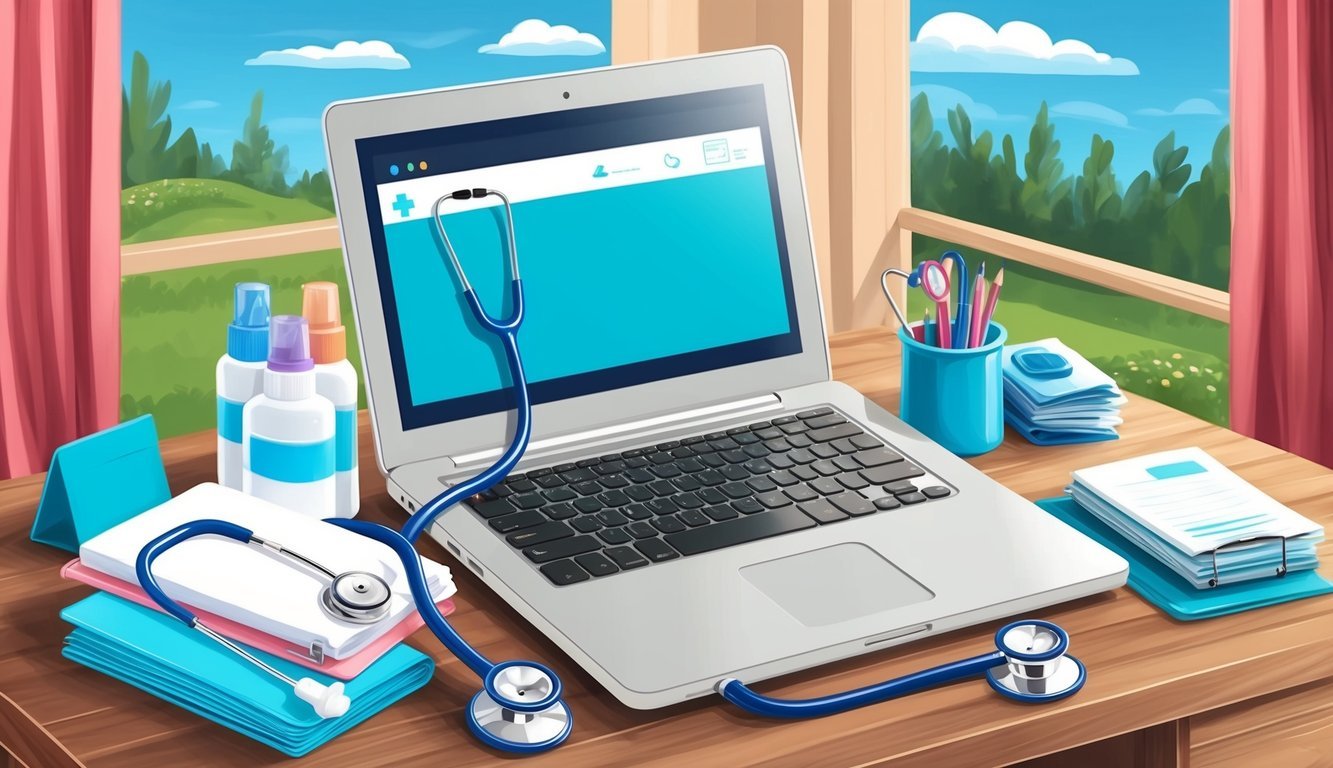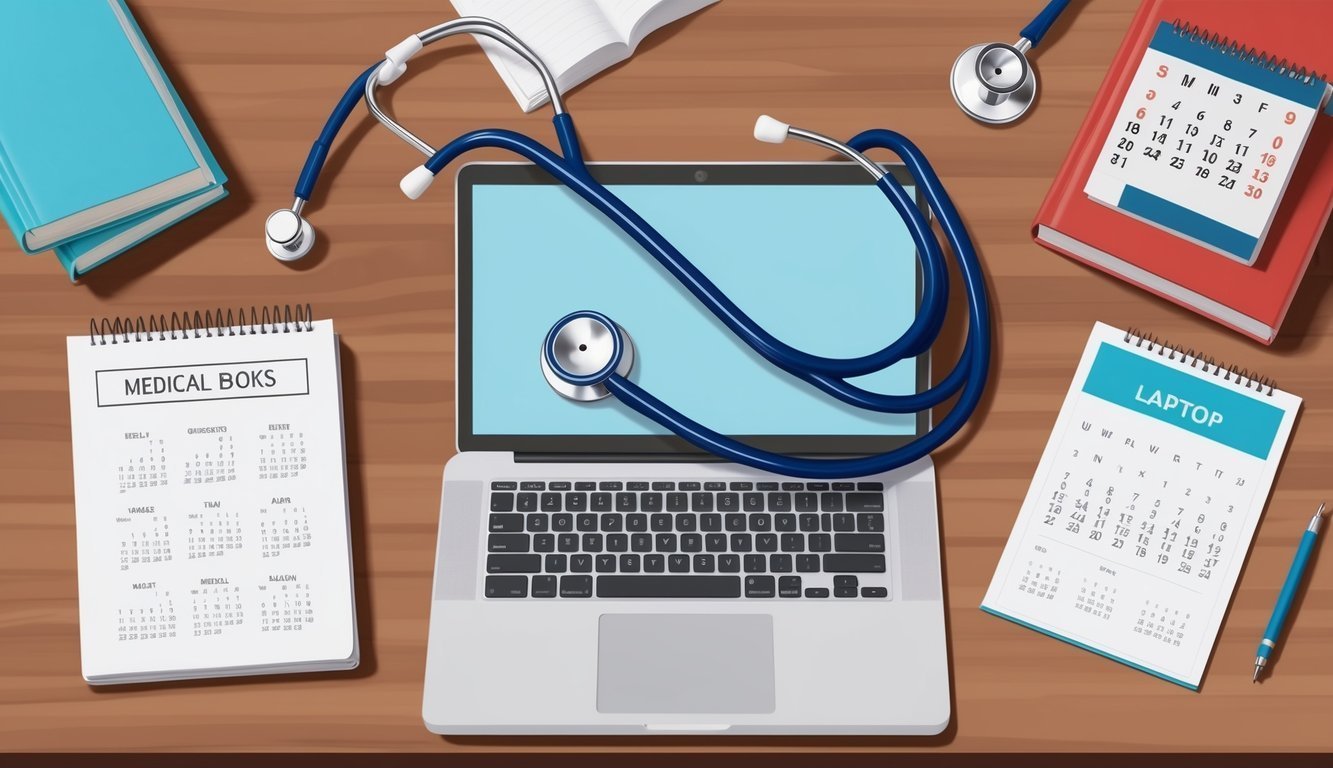Remote nursing jobs part time offer a flexible and rewarding career path for registered nurses seeking to balance their professional and personal lives.
You can provide essential patient care while enjoying the comfort of your own home.
As telehealth continues to grow, opportunities for part-time roles are expanding, fitting various schedules and lifestyles.
In these roles, you can work across different specialties, conducting telehealth consultations, assisting in care plans, or serving as a clinical educator.
Employers often seek registered nurses who can adapt to technology and deliver high-quality patient care remotely.
Additionally, the average pay for part-time remote nursing positions can be quite competitive, making them an appealing option.
For those interested in exploring these opportunities, numerous platforms list available positions.
Sites like Indeed and Glassdoor provide a comprehensive view of remote nursing jobs that can suit your needs.
Understanding Remote Nursing
Remote nursing is transforming healthcare by leveraging technology to provide care from a distance.
This enables nurses to offer essential services while enjoying the flexibility of working from home.
Key components include telehealth consultations, remote monitoring, and electronic medical records (EMR).
The Role of a Remote Nurse
As a remote nurse, your responsibilities encompass a variety of tasks that focus on patient care without the need for physical presence.
You may conduct telehealth consultations, assess patient conditions, and develop care plans.
Your role often involves working with diverse patient populations, which requires strong communication skills.
You must be adept at using technology to monitor patient health metrics, manage medications, and provide education on health management.
Key tasks include:
- Conducting virtual assessments
- Monitoring vital signs through remote devices
- Collaborating with healthcare teams via EMR
These tasks enhance patient outcomes and foster a strong therapeutic relationship, even from a distance.
Technologies Enabling Remote Nursing
Technology is crucial for remote nursing, providing the tools necessary for effective patient interaction.
Key technologies include:
| Technology | Function |
|---|---|
| Telehealth Platforms | Facilitate video consultations with patients |
| Remote Monitoring Devices | Track vital signs and symptom changes in real-time |
| Electronic Medical Records (EMR) | Store and manage patient data securely |
By utilizing telehealth platforms, you can reach a broader patient base and offer timely care.
Remote monitoring devices allow consistent tracking of health improvements, while EMR systems streamline patient information sharing among healthcare providers.
These technologies not only improve the efficiency of care delivery but also enhance patient experiences by fostering timely interventions and personalized treatment plans.
Types of Part-Time Remote Nursing Jobs
Part-time remote nursing jobs come in various forms, each offering unique responsibilities and opportunities for patient care.
Understanding the different types can help you find a role that aligns with your skills and interests.
Telehealth Triage Nursing
In telehealth triage nursing, you assess and prioritize patient needs through virtual communication.
Your role involves gathering patient information, evaluating symptoms, and providing guidance on the next steps for care.
Key tasks include:
- Conducting assessments via phone or video calls.
- Educating patients on treatment options.
- Directing patients to appropriate healthcare services based on urgency.
This position is crucial for ensuring timely interventions while maintaining a flexible work schedule.
You might find openings listed on platforms like Indeed or Glassdoor.
Remote Patient Monitoring
Remote patient monitoring involves using technology to oversee patients’ health outside of traditional healthcare settings.
You may utilize devices to track vital signs, medication adherence, and overall health status.
Essential duties often include:
- Monitoring data collected from wearable devices.
- Interpreting results and identifying potential health issues.
- Providing feedback and support to patients based on their metrics.
This role is pivotal for proactive healthcare management and can significantly impact patient outcomes.
Seek opportunities on job boards that specialize in telehealth positions.
Case Management Nursing
In case management nursing, you coordinate a patient’s overall care, ensuring that all healthcare needs are met.
You play a central role in navigating the healthcare system, advocating for patient health, and facilitating communication among providers.
Key responsibilities include:
- Developing care plans tailored to each patient’s needs.
- Connecting patients with necessary resources and services.
- Monitoring progress and adjusting care plans as needed.
This role demands strong organizational and communication skills, and it can lead to more comprehensive and continuous patient care.
Check sites like SimplyHired for available positions in this field.
Essential Skills and Requirements

To succeed in part-time remote nursing jobs, you need a specific set of qualifications and skills.
These elements not only ensure compliance with healthcare standards but also enhance patient interaction and safety.
Necessary Qualifications for Remote Nursing
For remote nursing positions, you must hold an active Registered Nurse (RN) license.
This is crucial for validating your competency in nursing practices.
Additional certifications like Telehealth Nursing or specialized training in areas such as pediatrics or geriatrics can set you apart.
Employers often look for candidates with experience in remote care settings.
Relevant work experience allows you to manage various patient scenarios remotely.
A Bachelor’s degree in Nursing is advantageous, but it’s not always essential.
Common qualifications include:
- Registered Nurse (RN) licensure
- Telehealth certifications
- Experience in remote care settings
You can enhance your resume by staying updated on the latest medical technology and telecommunication methods, ensuring you efficiently facilitate patient care.
Key Skills for Remote Patient Safety
Your ability to maintain patient safety in a remote environment is paramount.
Communication is fundamental; effective verbal and written skills help in conveying information clearly to patients.
Empathy and active listening are crucial to understanding patient concerns.
Technical skills are equally important.
Familiarity with telehealth platforms and digital health records allows you to navigate tools and provide quality care seamlessly.
Here are key skills for ensuring patient safety:
- Effective communication
- Empathy and active listening
- Technical proficiency with telehealth software
Additionally, knowledge of cybersecurity practices is vital for protecting patient data.
Ensuring the safety of personal health information builds trust with your patients and enhances their overall experience.
For more guidance on the required skills and resources for remote nursing positions, refer to this Essential Skills for Remote Nursing Jobs resource.
Benefits and Challenges of Remote Nursing Positions

Remote nursing positions offer unique advantages and certain challenges that can significantly impact your career satisfaction and effectiveness.
Understanding these factors is crucial for making informed decisions about your work environment.
Advantages of Working Part-Time in Remote Nursing
One of the primary benefits of part-time remote nursing is flexibility.
You can tailor your schedules to fit personal commitments.
This flexibility can help you achieve a better work-life balance, which is essential for your overall well-being.
Part-time positions often allow for rotational shifts, giving you the opportunity to work during preferred hours.
Additionally, many remote nursing roles offer competitive pay, with some positions, such as travel virtual care nurses, earning more than traditional nursing roles.
Benefits such as tuition reimbursement are frequently provided, enabling you to pursue further education without financial strain.
Moreover, remote nursing jobs eliminate commuting, saving you both time and money.
This can allow you to focus more on patient care and your skill development.
Potential Difficulties in Remote Nursing Roles
While there are numerous advantages, remote nursing positions also come with challenges. Communication barriers may arise due to the lack of in-person interactions, which can affect patient satisfaction.
If you handle patient complaints, the absence of physical presence may complicate your ability to assess situations effectively.
You might face technological issues as well—stable internet connections and reliable hardware are essential.
Technical difficulties can hinder your ability to perform efficiently.
Additionally, part-time roles may limit access to certain benefits, such as full healthcare coverage or retirement plans.
Lastly, working remotely might lead to feelings of isolation.
Without regular team interactions, establishing rapport with colleagues may take extra effort.
Finding and Securing Remote Nursing Opportunities

To successfully find remote nursing jobs, it’s crucial to employ effective job search strategies and present a polished application.
Focus on targeted resources and prepare thoroughly for interviews to increase your chances of securing a position.
Job Search Strategies for Remote Nursing Positions
Start by identifying reputable job boards dedicated to nursing roles, such as Indeed and Glassdoor.
Use keywords like “remote RN,” “part-time nurse,” or “telehealth nursing” to narrow down your options.
Networking can also enhance your job search.
Join professional nursing associations or online forums focused on remote opportunities.
Additionally, consider reaching out to former colleagues or mentors who may know of available positions.
Utilize social media platforms like LinkedIn to connect with employers and stay updated on job postings.
Regularly check company websites that interest you for openings in acute care or CCU nursing.
Resume and Interview Tips for Remote Nurse Candidates
When crafting your resume, emphasize your relevant nursing experience.
Highlight specific skill sets, such as telehealth proficiency or case management expertise.
Consider using a format like the table below for clarity:
| Skill | Experience Year |
|---|---|
| Telehealth Management | 3 years |
| Acute Care Coordination | 2 years |
| Patient Education | 4 years |
For interviews, prepare to discuss your adaptability and communication skills, which are vital in remote settings.
Also, familiarize yourself with the organization’s mission and values to tailor your responses.
Finally, practice common interview questions to articulate your experiences effectively.
Building a connection with the interviewer can also showcase your passion for nursing and your commitment to patient care.

